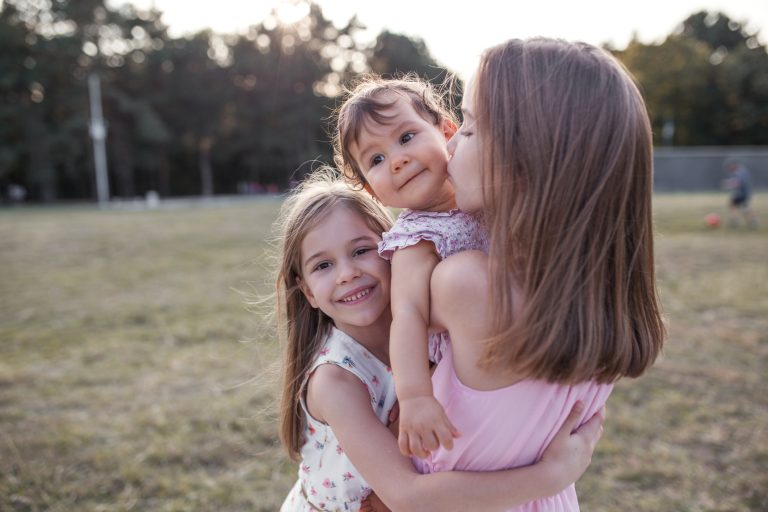We have no control over our birth order, whether we’re first, middle or youngest child – there is nothing we can do to change that. The Birth Order Theory shows how birth order plays a role in our personality traits. This is disconcerting when studies show where we sit in the birth order plays a profound and lasting effect on child development. However, Birth order is not a personality trait that appears at birth. Instead, it’s a theory that develops based on family structure and dynamics and how they shape personality traits during a child’s developmental years. These can also change and evolve; gender, adoption, blended families, and child death all play a role in the structure of birth order.
We all know a typical firstborn and a rebellious middle kid and a spoiled last child. We’ve probably also seen the comical depictions of birth order on TikTok. How much does our birth order impact our lives? Are over-achievers always the firstborn? Let’s look at birth order and see how it compares to your family!
The Firstborn
Firstborns are known to be achievers and leaders. They are responsible and organized. They sometimes have a feeling of superiority over others. Often than comes from their role of being the only child being taken away once a younger sibling arrives; because of this, they often get praised for nurturing the younger sibling. This leads to the firstborn’s aim for approval from authority figures to feel their worth. They are often perfectionists who can appear to be controlling. They need to be correct.
It’s not all bossy; this 2017 study found that firstborns are more extroverted, friendlier, and have greater emotional stability than other birth order positions. They’re also more nurturing and likely to be world -leaders or in caregiving positions.
Studies have shown that firth born have higher academic achievement, but not always because of having a higher IQ level. Instead, they’re driven to succeed. They’re also most likely to become CEOs, upper management, and even most world leaders are firstborn.
It’s thought that these traits come from strong parental expectations of the firstborn, combined with stricter parenting and an expectation that they act as a role model to younger siblings.
Firstborns are the rock.
The Middle Child
The middle child is stuck between two siblings, neither the leader nor the baby. As a result, they’re often overlooked and can feel left out. The traits of a middle child run so strong that it’s coined the name ‘Middle Child Syndrome’ Not only do middle children lose the status of being the baby, but they need to compete with both siblings. This often leaves them feeling neglected, which may be why the traits of the middle child are that they’re usually more impatient and boisterous. Some studies say that the rebellious middle child is more likely to be involved in delinquent behavior than their siblings.
They’re less likely to be family-oriented and form a close bond with their parents. For example, one study showed middle child is less likely to talk to their parents about sex education.
Because the middle child is often caught in-between siblings, they’re a more natural negotiator, have a more easy-going personality, and are more generous. It’s also believed because they often need to fend for themselves, it makes them more resourceful and resilient. They thrive in open office environments. They are great team players, like to be surrounded by friends, and often hold the group together. They like to get behind a cause, and fight for what they believe in.
They put others first.
The Youngest
The youngest child is often the most creative, spontaneous, and rebellious. They’re often the class clown.
They take on little responsibility and have not dealt with strict rules or expectations. The parenting has become more confident by the youngest, so the rules have been relaxed. They’re babied and therefore don’t need to take on hard work, so they’re said to give up more quickly. They have had many people do things for them all their lives, and they often struggle as adults to complete tasks without someone stepping in to assist. They are faster to reach developmental milestones (believed to keep up with older siblings). The youngest is more likely to be self-employed, even without entrepreneurial parents. They’re more creative. They’re also more likely to take risks.
“Youngests, above all else, will blow your mind.”
Birth order study: It’s about time
Some findings on the birth order theory state that it all comes down to the amount of time spent with each child. And while parents may dispute that and claim they spend equal time with their kids, it isn’t about day-to-day quality time. Instead, it’s referring to the overall time spent with each child between the 4th and 14th birthday. As families age, the amount of time spent as a family decreases. Therefore the younger children get less time with parents.
Studies on birth order often contradict themselves. Although it’s fun to read about and compare within our own family, ultimately, it is still a theory, and our outcomes are determined by so much more (family structure, socio-economic status and so much more) than just birth order.
Sibling Rivalry?
Looking for name labels for multiple kids to calm the siblings fighting over who owns what? Mabel’s Labels has a Split Name Label Pack! 

